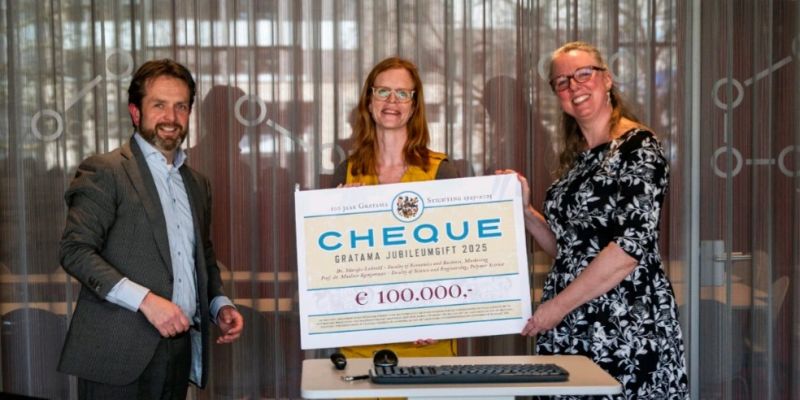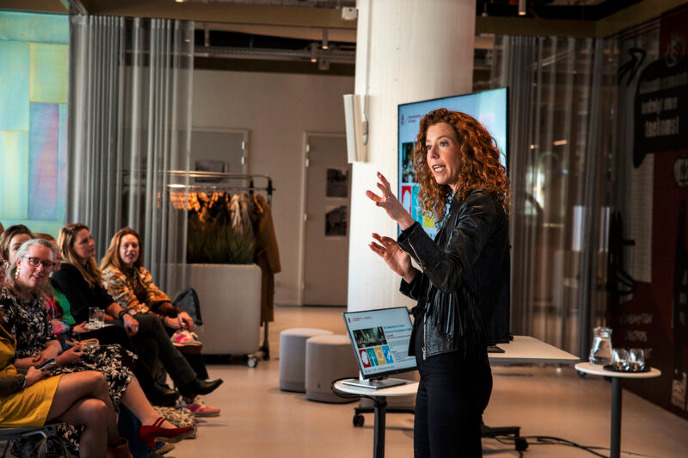Marijke Leliveld, Kim Poldner and colleagues receive Gratama Jubilee Gift for the project ‘Bio-fabricating mycelium textiles for sustainable fashion’

Marijke Leliveld, Kim Poldner, Marleen Kamperman and Tjeerd Veenhoven have received a Jubilee Gift of € 100,000 from the Gratama Foundation, in collaboration with the board of the Groninger University Fund. The research team received the funding for their project ‘Bio-fabricating mycelium textiles for sustainable fashion’.

The project is a collaboration between researchers from the Faculty of Economics and Business (FEB) and the Faculty of Science and Engineering (FSE). The project leaders are Associate Professor Marijke Leliveld (FEB) and Professor Marleen Kamperman (FSE). Endowed Professor Kim Poldner (FEB, Spatial Sciences) as well as Tjeerd Veenhoven (Studio Veenhoven) will also be closely involved in the project. The Jubilee gift was presented to the project leaders on Friday, March 28 during the symposium ‘The Future of Textiles: Creating Sustainable Ecosystems’, which preceded Kim Poldner's inaugural lecture officially installing her as Endowed Professor of Regional and Circular Economic Development at the University of Groningen.
Bio-fabricating mycelium textiles for sustainable fashion
The fashion industry is notorious for its negative impact on the environment and society, as the production process of clothing is a heavy burden on the environment. But several sustainable alternative materials have been developed in recent years. One interesting example is mycelium. This is a material made from moulds and fungal threads (for example leftovers from oyster mushroom cultivation). It is 100% biodegradable and you can grow it in all kinds of shapes. Such new materials could significantly change the fashion industry and contribute to the UN's Sustainable Development Goals, such as that of responsible consumption and production.
To get here, however, consumers must be open to these new materials. This is not easy, as many new, innovative products fail to sell well. This is also known as innovation resistance. In addition, consumers usually expect companies to make concessions on quality when making sustainable products. First, the grant gives the researchers the opportunity to better understand how consumers react to these new materials. “If we understand what prevents or encourages consumers to use new materials, we can also use this information to improve the materials themselves and their applications. This is therefore our second goal: to optimize the material so that it meets the needs within the fashion industry”, Leliveld explains.
The grant gives the researchers the opportunity to study both the material side and the consumer side of mycelium simultaneously. With the rapid exchange of insights from both fields and the interaction between material science and consumer behaviour, the grant gives the researchers a unique opportunity to study this new material systematically.
The Gratama Jubilee Gift and the Gratama Foundation
To mark its centenary, the Gratama Foundation has awarded a one-off Gratama Jubilee Gift of €100,000 each to researchers from the University of Groningen (UG) and Leiden University (LU), for a special interdisciplinary research project. The researchers from LU who received the jubilee gift are Johannes Müller, Claire Weeda en Krijn Trimbos, whose multidisciplinary project is titled ‘Seeing Hidden Change: A New Approach to Understanding Environmental Change and its Human Perception'. 100 years ago, the Gratama Foundation was established. It manages the estate of the eighteenth-century Gratama family, which includes professors at the universities of Groningen and Leiden. One of the Gratama Foundation's goals is to promote science at these two universities. It does so by annually funding research projects and by awarding the Gratama Science Prize, every other year to a young promising scientist from the UG and LU. The prize is awarded to a researcher at the UG in the even-numbered years and to a researcher at LU in the odd-numbered years.
| Last modified: | 02 April 2025 2.11 p.m. |
More news
-
25 April 2025
Leading microbiologist Arnold Driessen honoured
On 25 April 2025, Arnold Driessen (Horst, the Netherlands, 1958) received a Royal Decoration. Driessen is Professor of Molecular Microbiology and chair of the Molecular Microbiology research department of the Faculty of Science and Engineering at the...
-
24 April 2025
Highlighted papers April 2025
The antimalarial drug mefloquine could help treat genetic diseases such as cystic fibrosis, Duchenne muscular dystrophy, as well as some cancers.
-
22 April 2025
Microplastics and their effects on the human body
Professor of Respiratory Immunology Barbro Melgert has discovered how microplastics affect the lungs and can explain how to reduce our exposure.
